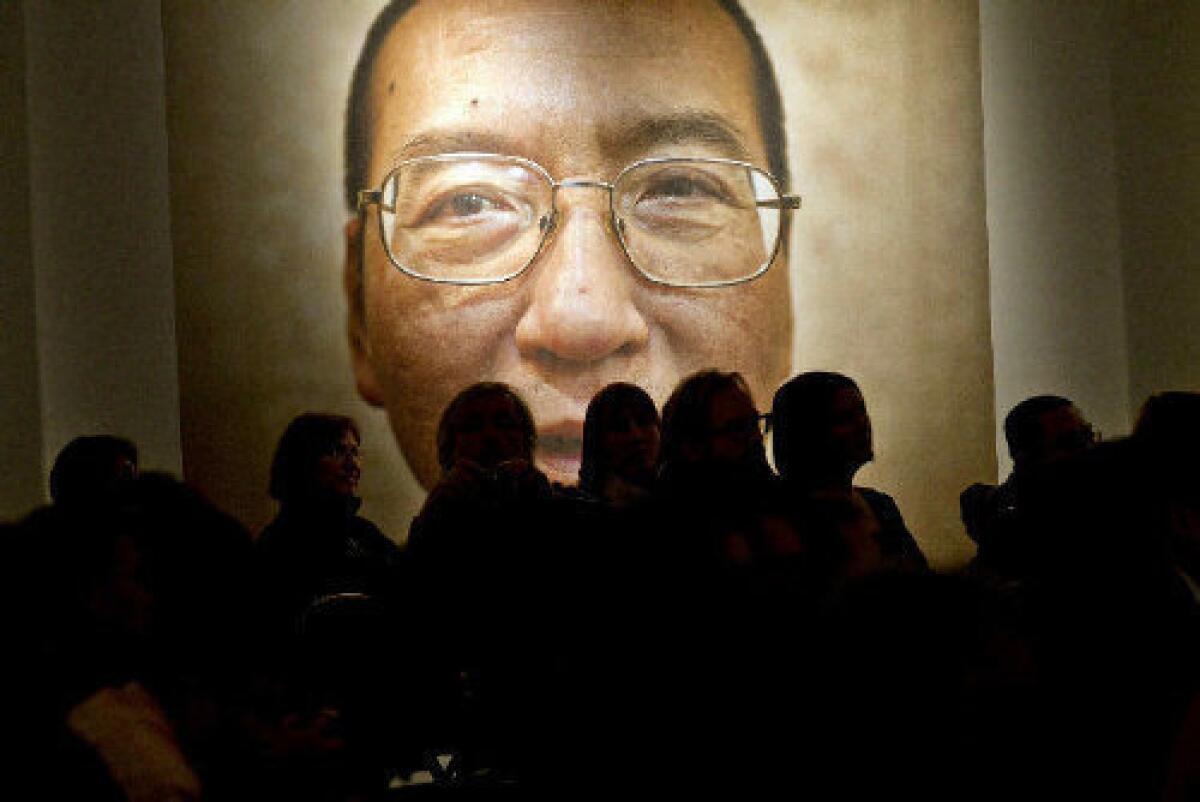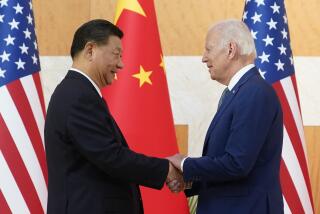Desmond Tutu’s plea: Stand up for Liu Xiaobo

- Share via
By all reports, when President Obama and Chinese President Xi Jinping meet in California this week for their first summit, their most important task will be to establish a strong rapport so they can manage the increasingly critical and complex U.S.-China relationship.
Although the focus of their conversations will surely cover such topics as North Korea and Iran’s nuclear programs, cyber attacks and trade, it is critically important that Xi also hear from Obama directly about the importance of China curtailing its persecution of dissidents and their families.
Emblematic of this repression is the plight of 2010 Nobel Peace Prize Laureate Liu Xiaobo and his wife, Liu Xia. Our organization, Freedom Now, which works to free prisoners of conscience through legal, political and advocacy efforts, filed a complaint in 2010 on behalf of the Lius with the U.N. Working Group on Arbitrary Detention.
Liu Xiaobo is a respected Chinese intellectual with a long history of putting his liberty at risk to defend the universal values of freedom and democracy. In 1989, he left the safety of Columbia University, where he was a visiting scholar, to return home and join the students protesting in Tiananmen Square. In response, the government held him for 20 months on “counterrevolution” charges and banned him from publishing in the country.
Despite more arrests, surveillance and harassment in the following years, Liu joined a group of reformers in drafting Charter 08, a manifesto calling for peaceful political reform in China based on the principles of human rights, freedom and democracy. He then made a fateful decision that put him and his family in the line of fire. He agreed to be the first signatory on Charter 08, which would ultimately secure thousands of signatures.
Just days before Charter 08 was to be made public in December 2008, police arrested Liu and held him incommunicado for three weeks, and without charge or access to a lawyer for nearly six months. His trial on “inciting subversion” charges lasted only two hours and the defense was allowed only 14 minutes to present its case. Ultimately, the court convicted Liu — citing as evidence his involvement in drafting Charter 08 and his online essays — and sentenced him to 11 years in prison.
Liu responded to the verdict with a statement: “I have long been aware that when an independent intellectual stands up to an autocratic state, step one toward freedom is often a step into prison. Now I am taking that step; and true freedom is that much nearer.”
Less well known is the Kafkaesque nightmare being suffered by his wife, Liu Xia. For more than 2 1/2 years since the Nobel announcement, she has been under strict house arrest in her one-bedroom apartment in Beijing. She is taken to visit her husband in prison once a month, but has no Internet access, telephone or ability to receive or send mail. Her life is controlled by Chinese security officials. The public recently caught a rare glimpse of Liu Xia in front of a Beijing courtroom. As journalists looked on, she shouted, “Tell everybody I’m not free!”
Liu Xia had been escorted from her apartment so she could observe the trial of her younger brother, who faces trumped-up charges of economic crimes. She was asked by a journalist why the Chinese government had allowed her out of the house. “They want to break one leg, then the other. I tell myself to stand straight, don’t be afraid,” she said. Then she asked, “Is it a crime to be Liu Xiaobo’s wife?”
In today’s China, the answer is yes. Yet the Chinese government had the audacity in response to our filing to the United Nations to claim that Liu Xia is “under no legal restriction.” The United Nations subsequently found that Liu Xiaobo and Liu Xia are being held in violation of international law and called for their release.
Lest one think that the situation of a Nobel Peace Prize laureate and his wife are unusual in modern China, Beijing’s spending this year on domestic security will exceed the budget of the People’s Liberation Army. In all, Beijing will spend $123.6 billion this year to protect itself from its own people — a jaw-dropping outlay, even for a country that experiences more than 100,000 protests annually on bread-and-butter issues such as corruption, environmental degradation and unpaid wages.
The Chinese government claims it does not seek confrontation domestically or abroad, even as it is simultaneously crushing dissent. But its behavior instead projects weakness and insecurity. There is no other way to interpret the inhumane actions of a government that believes anything can be justified in the name of the greater good.
When Obama meets President Xi, he must stand up to this repression and urge the release of his fellow Nobel Peace Prize laureate Liu Xiaobo and Liu Xia. If he won’t do that, who will?
Desmond M. Tutu is archbishop emeritus of Cape Town and recipient of the 1984 Nobel Peace Prize. Jared Genser serves as international counsel to Liu Xiaobo. They are honorary chairman and founder, respectively, of Freedom Now.
More to Read
A cure for the common opinion
Get thought-provoking perspectives with our weekly newsletter.
You may occasionally receive promotional content from the Los Angeles Times.









